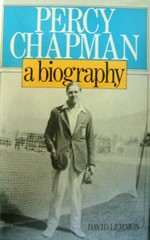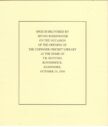Percy Chapman – A Biography
Martin Chandler |Published: 1985
Pages: 162
Author: Lemmon, David
Publisher: Queen Anne Press
Rating: 3.5 stars

The author David Lemmon was, for the 15 years before his early death in 1998, the most prolific writer of cricket books the game has seen. There are a total of 37 publications on the game, which bear his name – when the second edition of cricket’s bibliography was published in 1984 there was only one. As a consequence reviews of his work from time to time use the word “rushed” but, certainly in the case of this book, there should be no such criticism.
Lemmon’s biography of Percy Chapman, is, for this reviewer, by some distance his best work representing as it does the only detailed treatment of the life of a largely forgotten cricketer. While his batting record may not indicate greatness Chapman was, in the second half of the 1920’s, as talismanic as the likes of Flintoff, Tendulkar and Warne have been in recent times. A gentleman amateur of the old school Chapman was a hugely gifted all round sportsman who enjoyed a rapid rise to fame while at Cambridge University. He was, above all, a stylish and aggressive left handed batsman and, in his time, was a fieldsman who had no equal.
Chapman made his Test debut against South Africa while still a minor counties player in 1924, and the following winter he went to Australia with Arthur Gilligan’s England side. In the final Test of the 1926 series the young Chapman was, somewhat controversially, elevated to the captaincy of England for that decisive match which resulted in the Ashes being won by England for the first time since the Great War. Chapman then embarked on a sequence of nine consecutive Test victories as captain including the triumphant march through Australia in 1928/29 before, again controversially, he was stripped of the captaincy after England lost the second Test of the 1930 series at Lords. Chapman appeared to pay the price for choosing to blaze away in the England second innings for his only Test century rather than attempting to block the game out which might well have brought England a draw.
Chapman was hugely popular with players and spectators alike. He was no sort of a disciplinarian and no great tactician but he somehow managed to bring out the best in all he had dealings with and he was renowned for living life to the full.
After losing the England captaincy, although he was clearly unwilling and/or unable to do anything about it, Chapman quickly learned that what the Gods give the Gods can easily take away. As the years of good living took their toll his weight ballooned, and consequently his mobility left him as, during the Second World War did his wife, and his descent into alcoholism was something he would never overcome. Fortunately for him Chapman had a few good friends who did not desert him and who provided him with a home and some stability, but the years until his death in 1961 were a time of sad decline.
David Lemmon’s book is a gentle and laconic reconstruction of Chapman’s life written by a man who clearly had considerable affection for his subject but who retains his objectivity throughout. The book is not overly long, the text occupying only 138 pages, and that is perhaps the fault that it has. Chapman’s story, unlike that of some cricketers, fully justifies a deeper examination and the reader is left with the feeling that had Lemmon had the time or the resources to travel to New Zealand to meet the former Mrs Chapman, who he had some correspondence with and who was clearly prepared to co-operate in the project, then this could have been one of the most impressive cricketing biographies ever written and certainly the magnum opus by which all would remember David Lemmon. As it is the book is merely “very good” but still one which anyone with any interest in the era should certainly make the effort to track down a copy of.






Leave a comment